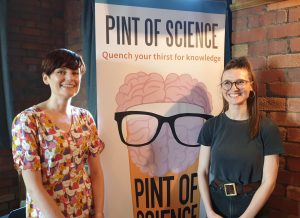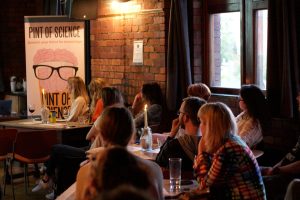 Gemma Sharp and Flo Martin reflect on the importance of engaging with men, as well as women, when it comes to public engagement about menstruation and pregnancy research
Gemma Sharp and Flo Martin reflect on the importance of engaging with men, as well as women, when it comes to public engagement about menstruation and pregnancy research
We recently spoke at a Pint of Science event about “Wandering wombs and menstrual health” (read more about the event in this case study). One issue that stood out from the demographics of the meeting – and indeed from simply looking around the packed upstairs room of the pub – was the gender imbalance; almost all of the audience members were female. What’s more, all the audience were under 50, with 40% of the audience in the age range 25 to 34.
Given the topic of our two talks, the demographics were not surprising. Gemma spoke about menstrual and mental health while Flo spoke about use of anti-depressants in pregnancy. And, although we deliberately steered away from titles that might suggest men would not be welcome, we definitely expected a gender imbalance.
However, such an imbalance in engagement is a problem, and one that the few men who were there identified to us in conversations afterwards. Getting more men learning about and interested in research into menstruation and pregnancy-related topics is very important. We see the lack of wider engagement as one of the reasons why there is such a gender health gap in healthcare and outcomes; it’s seen as “women’s problems” – just for women to think and talk about. You can read more about the gender health gap in Caroline Criado Perez’s excellent book “Invisible Women”.
Menstrual health, in particular, attracts a lot of stigma; in general, it is kept out of the public eye and people don’t really talk about it. Pregnancy is something that directly affects many, including those who can’t themselves become pregnant, and debate in this area engages more diverse voices. However, in spite of this, certain behaviours during pregnancy are heavily stigmatised, often in the absence of good evidence for such stigma, like medication use for example.

But, even when there are lower stigmas and barriers to engaging, there has been, and still is, a gap when it comes to education. We have moved on from the ideas of many centuries ago about wombs wandering around women’s bodies and causing hysteria or treatment approaches such as wafting bitter herbs. But in the 1980s, NASA suggested astronaut Sally Ride might need 100 tampons for a week in space. Education about menstruation and pregnancy – and related research such as ours – barely extends in some cases to people who menstruate, let alone people who don’t.
This education is important for the whole life cycle of menstruation. Gemma has led the setup of a multi-disciplinary research network, 4M, which stands for menarche (the start of periods), menstruation, menopause (the end of periods), and mental health. The idea is to bring together researchers who are interested in all aspects of menstrual health in relation to mental health, regardless of their field of study. We each bring a different set of expertise and perspectives to the discussions, which helps us come up with new and exciting ideas for research.
When we first started talking, we were just going to talk about mental health throughout the menstrual cycle. However, everybody’s interests were so broad within the group that, although it’s very ambitious, we realised we were also very interested in experiences around menarche and puberty, and the menopause.
It makes sense to have all those things being discussed by the same people. There is a danger of feeling like discussions about menstruation are just for people who menstruate, the vast majority of whom are going to be younger women. But that then leaves many people out of the conversation, including people that are on birth control or pregnant or who have already gone through the menopause.
We hope that engaging through activities like Pint of Science will help improve understanding of these issues, reduce stigma and enable people to support each other better. Regardless of what stage everyone is at or whether they ever personally experience these issues, it’s good for everyone to have all the information at hand so that they can help out and not judge, which would create a more positive atmosphere around all these topics.
